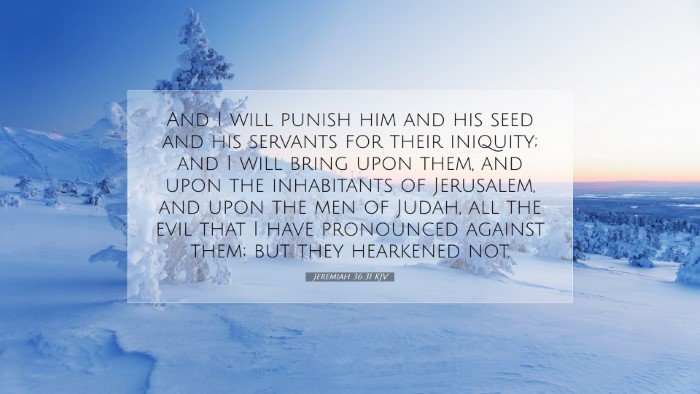Bible Commentary on Jeremiah 36:31
Verse: "And I will punish him and his descendants and his attendants for their wickedness; I will bring on them and those living in Jerusalem and the people of Judah every disaster I pronounced against them, because they have not listened." (Jeremiah 36:31)
Contextual Background
The book of Jeremiah is set against the backdrop of the final years of Judah before its fall to Babylon. Jeremiah, a prophet called at a young age, faced immense opposition as he spoke the words of the Lord in a turbulent time. His ministry was marked by warnings of impending judgment due to the persistent unfaithfulness of the people and their leaders.
Jeremiah 36:31 addresses the consequences of disobedience, spotlighting God's pronounced judgment not only on King Jehoiakim but also on his descendants and advisers.
Analysis of the Verse
This verse reflects several core themes relevant to the broader narrative of Judah's experience with God:
- Divine Judgment: The certainty of judgment is emphasized. God asserts His intention to punish the wicked, affirming the principle that sin has dire consequences.
- Generational Accountability: The mention of Jehoiakim's descendants highlights the biblical concept that the consequences of leadership affect future generations, emphasizing the weightiness of authority.
- Collective Responsibility: The inclusion of both the people of Jerusalem and the inhabitants of Judah signifies that communal sin entails communal consequences, showcasing the societal implications of individual accountability.
Insights from Commentators
Matthew Henry
Henry notes that this passage serves as a sobering reminder of God's justice. He emphasizes that the sin of Jehoiakim—demonstrated by his rejection of Jeremiah's prophecies and his violent acts against God's messengers—produced a ripple effect of judgment. Henry asserts that God holds kings to a higher standard due to their influence and responsibility.
Albert Barnes
Barnes elaborates on the idea of judgment being not merely a punitive action but a corrective measure ordained by God to bring His people back into proper relationship with Him. He underscores that God’s disfavor is a serious matter, impacting not just rulers but an entire nation, which kept ignoring divine guidance. Barnes notes that “the disasters” mentioned are a compilation of various forms of calamity, thus illustrating the seriousness of persistent disobedience to divine instructions.
Adam Clarke
Clarke comments on the “temporal punishments” associated with failing to heed God’s words, highlighting that this punishment is not merely physical but also spiritual. He points out the connection between spiritual apathy and subsequent earthly consequences. Clarke emphasizes that this text invites introspection regarding the leaders' conduct, urging modern readers to consider the weight of influence they wield in society.
Theological Implications
This verse presents profound theological reflections for scholars and clergy alike:
- The Sovereignty of God: The verse underscores God's control and authority over all human affairs, asserting His right to judge and enact order.
- The Nature of Divine Justice: God’s justice is portrayed as inevitable and comprehensive, impacting not just individual sinners but entire communities.
- The Call to Repentance: The assurances of punishment provided a stark opportunity for repentance. The implications are profound; in times of national crisis, leaders can turn hearts back to God.
Practical Applications
For pastors and church leaders, the message of judgment serves as a vital reminder of the necessity of repentance and the seriousness of leading God's people. So, how can we apply the lessons of Jeremiah 36:31 today?
- Leading by Example: Church leaders are called to exemplify faithfulness and integrity. Jehoiakim’s downfall serves as a cautionary tale regarding the consequences of neglecting God’s word.
- Faithful Teaching: The duty to preach the full counsel of God, including warnings about consequences for sin, should be taken seriously; this is a protective mechanism for both the church and its leaders.
- Encouraging Community Accountability: One of the key messages of communal judgment is the importance of mutual support in maintaining faithfulness. Encouraging accountability among congregants can promote a culture of holiness.
Conclusion
Jeremiah 36:31 stands as a crucial reminder of God’s unwavering commitment to justice, the intricate relationship between leadership and communal fate, and the ever-present call to heed His word. The insights from historical commentators illuminate the depth of meaning contained within this verse, compelling all—pastors, students, theologians, and scholars—to reflect deeply on their spiritual and communal responsibilities. May the lessons derived from this passage lead to a deeper understanding of God’s nature and a renewed commitment to living in accordance with His principles.


